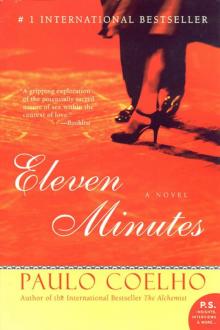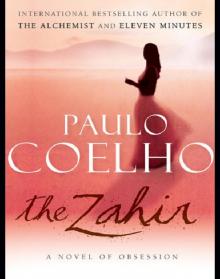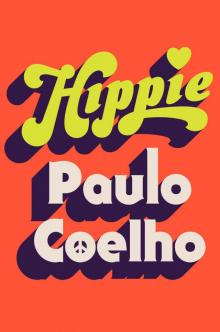- Home
- Paulo Coelho
Eleven Minutes Page 4
Eleven Minutes Read online
Page 4
Besides, everything around her was very like Brazil in general and her own small town in particular: the women spoke Portuguese, complained about men, talked loudly, moaned about their working hours, turned up late at the club, defied the boss, thought themselves the most beautiful women in the world, and told stories about their Prince Charmings, who were usually living miles away or were married or had no money and so sponged off them. Contrary to what she had imagined from the leaflets Roger had brought with him, the club was exactly as Vivian had said it was: it had a family atmosphere. The girls--described on their work permits as "samba dancers"--were not allowed to accept invitations or to go out with the customers. If they were caught receiving a note with someone's telephone number on it, they were suspended from work for two whole weeks. Maria, who had expected something livelier and more exciting, gradually allowed herself to succumb to sadness and boredom.
During the first two weeks, she barely left the boarding house where she was living, especially when she discovered that no one spoke her language, even if she said everything VE-RY SLOW-LY. She was also surprised to learn that, unlike in her own country, the city in which she was living had two different names--it was Geneve to those who lived there and Genebra to Brazilians.
Finally, in the long, tedious hours spent in her small, TV-less room, she concluded:
(a) she would never find what she was looking for if she couldn't express herself. In order to do that, she needed to learn the local language.
(b) since all her colleagues were looking for the same thing, she needed to be different. For that particular problem, she as yet lacked both a solution or a method.
From Maria's diary, four weeks after arriving in Geneve/Genebra:
I've already been here an eternity, I don't speak the language, I spend all day listening to music on the radio, looking round my room, thinking about Brazil, longing for work to begin and, when I'm working, longing to get back to the boarding house. In other words, I'm living the future not the present.
One day, at some distant future date, I'll get my ticket home, and I can go back to Brazil, marry the owner of the draper's shop and listen to the malicious comments of those friends who, never having taken any risks themselves, can only see other people's failures. No, I can't go back like that. I'd rather throw myself out of the plane as it's crossing the ocean.
Since you can't open the windows in the plane (I had never expected that. What a shame not to be able to breathe in the pure air!), I will die here. But before I die, I want to fight for life. If I can walk on my own, I can go wherever I like.
The following day, she enrolled in a French course that was run in the mornings, and there she met people of all creeds, beliefs and ages, men wearing brightly colored clothes and lots of gold bracelets, women who always wore a headscarf, children who learned more quickly than the grown-ups, when it should have been the other way around, since grown-ups have more experience. She felt proud when she found out that everyone knew about her country--Carnival, the samba, football, and the most famous person in the world, Pele. At first, she wanted to be nice and so tried to correct their pronunciation (it's Pele! Pele!), but after a while, she gave up, since they also insisted on calling her Maria, with that mania foreigners have for changing all foreign names and believing that they are always right.
In the afternoons, so as to practice the language, she took her first steps around this city of two names. She discovered some delicious chocolate, a cheese she had never eaten before, a huge fountain in the middle of the lake, snow (which no one back home had ever touched), storks, and restaurants with fire-places (although she never went inside, just seeing the fire blazing away gave her a pleasant feeling of well-being). She was also surprised to find that not all the shop signs advertised clocks; there were banks too, although she couldn't quite understand why there were so many for so few inhabitants, and why she rarely saw anyone inside them. She decided, however, not to ask any questions.
After three months of keeping a tight rein on herself at work, her Brazilian blood--as sensual and sexual as everyone thinks--made its voice heard; she fell in love with an Arab who was studying French with her in the same course. The affair lasted three weeks until, one night, she decided to take time off and go and visit a mountain on the outskirts of Geneva; this provoked a summons to Roger's office as soon as she arrived at work the following day.
No sooner had she opened the door than she was summarily dismissed for setting a bad example to the other girls working there. A hysterical Roger said that, yet again, he had been let down, that Brazilian women couldn't be trusted (oh dear, this mania for making generalizations about everything). She tried telling him that she had had a very high fever brought on by the sudden change in climate, but the man would not be persuaded and even claimed that he would have to go straight back to Brazil in order to find a replacement, and that he would have been far better off putting on a show using Yugoslav music and Yugoslav dancers who were far prettier and far more reliable.
Maria might be young but she was no fool, especially once her Arab lover had told her that Swiss employment laws were very strict and, since the nightclub kept back a large part of her salary, she could easily allege that she was being used for slave labor.
She went back to Roger's office, this time speaking reasonable French, which now included the word "lawyer." She left with a few insults and five thousand dollars in compensation--a sum of money beyond her wildest dreams--and all because of that magic word "lawyer." Now she was free to spend time with her Arab lover, buy a few presents, take some photos of the snow, and go back home in triumph.
The first thing she did was telephone her mother's neighbor to say that she was happy, had a brilliant career ahead of her and that there was no need for her family to worry. Then, since she had to leave the room in the boarding house that Roger had arranged for her, she had no alternative but to go to her Arab boyfriend, swear undying love, convert to his religion and marry him, even if she had to wear one of those strange headscarves; after all, as everyone knew, all Arabs were extremely wealthy and that was enough.
The Arab, however, was already far away, possibly in Arabia, a country Maria had never even heard of, and, deep down, she gave thanks to the Virgin Mary because she had not been obliged to betray her religion. She now had a reasonable grasp of spoken French, enough money for her return ticket, a work permit as a "samba dancer" and a current visa; so, knowing that she could always go back and marry her former boss, she decided to try to earn money with her looks.
In Brazil she had read a book about a shepherd who, in searching for his treasure, encounters various difficulties, and these difficulties help him to get what he wants; she was in exactly the same position. She was aware now that the reason she had been dismissed was so that she could find her true destiny, as a model.
She rented a small room (with no television, but she had to live frugally until she began earning lots of money), and the following day, started doing the rounds of the agencies. They all told her that she needed to get some professional photos taken, but this, after all, was an investment in her career--dreams don't come cheap. She spent a large part of her money on an excellent photographer, who spoke little, but was extremely demanding: he had a vast selection of clothes in his studio and she posed for him in various outfits, sober and extravagant, and even in a bikini of which the only person she knew in Rio de Janeiro, the security officer-cum-interpreter-cum-former agent, Mailson, would have been proud. She asked for several extra copies and sent them off to her family with a letter saying how happy she was in Switzerland. They would all think she was rich and the owner of an enviable wardrobe, and that she had been transformed into her town's most illustrious daughter. If all went to plan (and she had read enough books on "positive thinking" to be convinced that victory was assured), she would be greeted by a brass band on her return home and would try to persuade the mayor to have a square named after her.
Since she had no permanent
address, she bought a mobile phone, the sort that use pre-paid phone cards, and in the days that followed, she waited for job offers. She ate in Chinese restaurants (which were the cheapest) and, to pass the time, she studied furiously.
But time dragged, and the telephone didn't ring. To her surprise, no one bothered her when she went for walks by the lake, apart from a few drug-pushers who always hung around in the same place, underneath one of the bridges that connect the lovely old public gardens to the newer part of the city. She began to doubt her looks, until an ex-colleague, whom she bumped into by chance in a cafe, told her that it wasn't her fault, it was the fault of the Swiss, who hate to bother anyone, and of other foreigners, who were all afraid of being arrested for "sexual harassment"--a concept that made relations between men and women even more complicated.
From Maria's diary, one night when she lacked the courage to go out, to live or to continue waiting for the phone call that never came:
I spent today outside a funfair. Since I can't afford to fritter my money away, I thought it best just to watch other people. I stood for a long time by the roller coaster, and I noticed that most people get on it in search of excitement, but that once it starts, they are terrified and want the cars to stop.
What do they expect? Having chosen adventure, shouldn't they be prepared to go the whole way? Or do they think that the intelligent thing to do would be to avoid the ups and downs and spend all their time on a carousel, going round and round on the spot?
At the moment, I'm far too lonely to think about love, but I have to believe that it will happen, that I will find a job and that I am here because I chose this fate. The roller coaster is my life; life is a fast, dizzying game; life is a parachute jump; it's taking chances, falling over and getting up again; it's mountaineering; it's wanting to get to the very top of yourself and to feel angry and dissatisfied when you don't manage it.
It isn't easy being far from my family and from the language in which I can express all my feelings and emotions, but, from now on, whenever I feel depressed, I will remember that funfair. If I had fallen asleep and suddenly woken up on a roller coaster, what would I feel?
Well, I would feel trapped and sick, terrified of every bend, wanting to get off. However, if I believe that the track is my destiny and that God is in charge of the machine, then the nightmare becomes something thrilling. It becomes exactly what it is, a roller coaster, a safe, reliable toy, which will eventually stop, but, while the journey lasts, I must look at the surrounding landscape and whoop with excitement.
Although she was capable of writing very wise thoughts, she was quite incapable of following her own advice; her periods of depression became more frequent and the phone still refused to ring. To distract herself during these empty hours, and in order to practice her French, she began buying magazines about celebrities, but realized at once that she was spending too much money, and so she looked for the nearest lending library. The woman in charge told her that they didn't lend out magazines, but that she could suggest a few books that would help improve her French.
"I haven't got time to read books."
"What do you mean you haven't got time? What are you doing?"
"Lots of things: studying French, writing a diary, and..."
"And what?"
She was about to say "waiting for the phone to ring," but she thought it best to say nothing.
"My dear, you're still very young, you've got your whole life ahead of you. Read. Forget everything you've been told about books and just read."
"I've read loads of books."
Suddenly, Maria remembered what Mailson the security officer had told her about "vibes." The librarian before her seemed a very sweet, sensitive person, someone who might be able to help her if all else failed. She needed to win her over; her instinct was telling her that this woman could become her friend. She quickly changed tack.
"But I'd like to read more. Could you help me choose some books?"
The woman brought her The Little Prince. She started leafing through it that same night, saw the drawings on the first page of what seemed to be a hat, but which, according to the author, all children would instantly recognize as a snake with an elephant inside it. "Well, I don't think I can ever have been a child, then," she thought. "To me, it looks more like a hat." In the absence of any television to watch, she accompanied the prince on his journeys, feeling sad whenever the word "love" appeared, for she had forbidden herself to think about the subject at the risk of feeling suicidal. However, apart from the painful, romantic scenes between a prince, a fox and a rose, the book was really interesting, and she didn't keep checking every five minutes that the battery in her mobile phone was still fully charged (she was terrified of missing her big chance purely out of carelessness).
Maria became a regular visitor to the library, where she would chat to the woman, who seemed as lonely as she was, ask her to suggest more books and discuss life and authors--until her money had nearly run out. Another two weeks and she would not even have enough left to buy her ticket back to Brazil.
And, since life always waits for some crisis to occur before revealing itself at its most brilliant, the phone finally rang.
Three months after discovering the word "lawyer" and after two months of living on the compensation she had received, someone from a model agency asked if Senhora Maria was still at this number. The reply was a cool, long-rehearsed "yes," so as not to appear too eager. She learned that an Arab gentleman, who worked in the fashion industry in his country, had been very taken by her photos and wanted to invite her to take part in a fashion show. Maria remembered her recent disappointments, but also the money that she so desperately needed.
They arranged to meet in a very chic restaurant. She found herself with an elegant man, older and more charming than Roger, who asked her:
"Do you know who painted that picture over there? It's a Miro. Have you heard of Joan Miro?"
Maria said nothing, as if she were concentrating on the food, rather different from that in the Chinese restaurants where she normally ate. Meanwhile, she made a mental note: on her next visit to the library, she would have to ask for a book about Miro.
But the Arab was saying:
"This was the table where Fellini always sat. Do you know his films at all?"
She said she adored them. The man began asking more probing questions and Maria, knowing that she would fail the test, decided to be straight with him:
"I'm not going to spend the evening pretending to you. I can just about tell the difference between Coca-Cola and Pepsi, but that's about it. I thought we came here to discuss a fashion show."
He seemed to appreciate her frankness.
"We'll do that when we have our after-supper drink."
There was a pause, while they looked at each other, each trying to imagine what the other was thinking.
"You're very pretty," said the man. "If you come up and have a drink with me in my hotel room, I'll give you a thousand francs."
Maria understood at once. Was it the fault of the model agency? Was it her fault? Should she have found out more about the nature of this supper? It wasn't the agency's fault, or hers, or the man's: this was simply how things worked. Suddenly she missed her hometown, missed Brazil, missed her mother's arms. She remembered Mailson, on the beach, when he had mentioned a fee of three hundred dollars; at the time, she had thought it funny, much more than she would have expected to receive for spending the night with a man. However, at that moment, she realized that she had no one, absolutely no one in the world she could talk to; she was alone in a strange city, a relatively experienced twenty-two-year-old, but none of her experience could help her to decide what would be the best response.
"Could you pour me some more wine, please."
The Arab man filled her glass, and her thoughts travelled faster than the Little Prince on his travels to all those planets. She had come in search of adventure, money and possibly a husband; she had known that she would end up gettin
g proposals such as this, because she was no innocent and was used to the ways of men. She still believed in model agencies, stardom, a rich husband, a family, children, grandchildren, nice clothes, a triumphant return to the place where she was born. She dreamed of overcoming all difficulties purely by dint of her own intelligence, charm and willpower.
But reality had just fallen in on her. To the man's surprise, she began to cry. He did not know what to do, caught between his fear of causing a scandal and his instinctive desire to protect her. He called the waiter over in order to ask for the bill, but Maria stopped him.
"No, don't do that. Pour me some more wine and just let me cry for a while."
And Maria thought about the little boy who had asked to borrow a pencil, about the young man who had kissed her and how she had kept her mouth closed, about her excitement at seeing Rio for the first time, about the men who had used her and given nothing back, about the passions and loves lost along the way. Despite her apparent freedom, her life consisted of endless hours spent waiting for a miracle, for true love, for an adventure with the same romantic ending she had seen in films and read about in books. A writer once said that it is not time that changes man, nor knowledge; the only thing that can change someone's mind is love. What nonsense! The person who wrote that clearly knew only one side of the coin.
Love was undoubtedly one of the things capable of changing a person's whole life, from one moment to the next. But there was the other side of the coin, the second thing that could make a human being take a totally different course from the one he or she had planned; and that was called despair. Yes, perhaps love really could transform someone, but despair did the job more quickly. What should she do? Should she run back to Brazil, become a teacher of French and marry her former boss? Should she take a small step forward; after all, it was only one night, in a city where she knew no one and no one knew her. Would that one night and that easy money mean that she would inevitably carry on until she reached a point in the road where there was no turning back? What was happening here--a great opportunity or a test set her by the Virgin Mary?

 The Alchemist
The Alchemist Maktub
Maktub Like the Flowing River
Like the Flowing River The Winner Stands Alone
The Winner Stands Alone The Spy
The Spy By the River Piedra I Sat Down and Wept: A Novel of Forgiveness
By the River Piedra I Sat Down and Wept: A Novel of Forgiveness Eleven Minutes
Eleven Minutes Manuscript Found in Accra
Manuscript Found in Accra Warrior of the Light
Warrior of the Light Veronika Decides to Die: A Novel of Redemption
Veronika Decides to Die: A Novel of Redemption The Devil and Miss Prym: A Novel of Temptation
The Devil and Miss Prym: A Novel of Temptation The Valkyries: An Encounter With Angels
The Valkyries: An Encounter With Angels Brida: A Novel
Brida: A Novel Fifth Mountain: A Novel
Fifth Mountain: A Novel Adultery
Adultery Inspirations
Inspirations The Archer
The Archer The Witch of Portobello
The Witch of Portobello The Pilgrimage
The Pilgrimage The Zahir
The Zahir Brida
Brida The Fifth Mountain
The Fifth Mountain Like the Flowing River: Thoughts and Reflections
Like the Flowing River: Thoughts and Reflections Manual of the Warrior of Light
Manual of the Warrior of Light By The River Piedra I Sat Down & Wept
By The River Piedra I Sat Down & Wept The Supreme Gift
The Supreme Gift Aleph
Aleph Hippie
Hippie Witch of Portobello
Witch of Portobello The Devil and Miss Prym
The Devil and Miss Prym The Alchemist - 10th Anniversary Edition
The Alchemist - 10th Anniversary Edition The Valkyries
The Valkyries